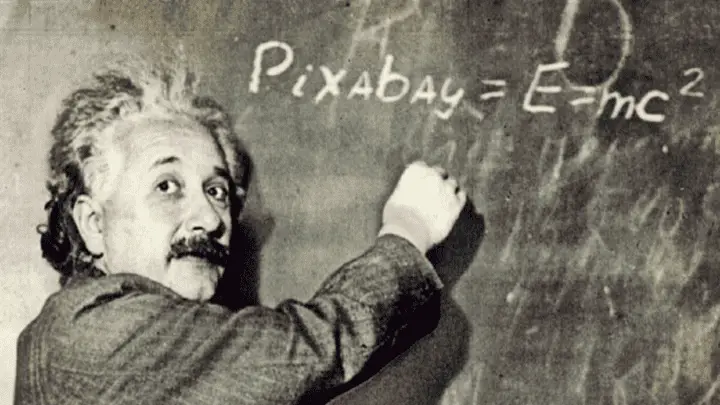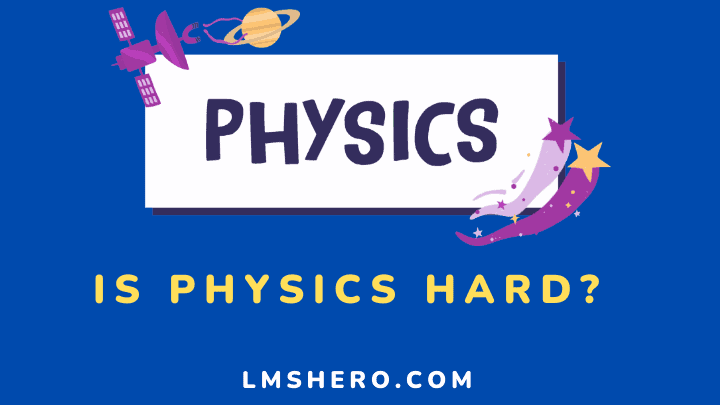Many people think that physics is hard, but is it really? Some people swear that it’s challenging, while others maintain that the subject is not as challenging as many people make it out to be.
Despite the intimidating aspects of the discipline, physics is just a collection of simple principles and equations that help explain the natural world.
The true nature of physics is bound to remain a mystery, but we know that it can be gratifying when mastered.
If you’re interested in learning more about this fascinating subject, read this article on whether physics is hard.
Is physics hard?
Physics is hard. Everybody knows that. However, there are a lot of misconceptions out there about how complex the subject is.
In reality, physics is not that hard. All you need is a basic understanding of the universe, and you’re good to go.
It is all about understanding the patterns behind chaos. It’s figuring out what makes things tick.
And sometimes, when you’re staring at a complicated equation or diagram, all you can think is: Why does this have to be so complicated?”
The following are some of the reasons why most people think physics is hard:
- Most people think physics is hard because they don’t understand it
- Most people think the subject is all about making complicated graphs, and diagrams, or figuring out equations
- Even very elementary concepts can be quite confusing at first
- It is hard because it is full of theoretical concepts
- It is complex and requires a lot of mathematical understanding
- Another factor may be the teacher taking the subject
- Laboratory experiments can also be challenging
Are you one of those who think physics is hard? Guess what? It’s not. In fact, at its core, it is quite simple.
You just have to learn the basics, and then you can start understanding all the weird and amazing things that happen in the world around you.
So don’t be afraid—physics is a subject that everyone can learn, no matter their age or level of experience.
Why is there so much math in physics?
Physics is all about solving problems. And when it comes to problems in physics, math is essential. Without math, we wouldn’t be able to model the world around us or understand how physical laws work.
Much of what physicists learn in their graduate and post-graduate studies is based on mathematical models. So why is math so important in physics?
Because without it, we wouldn’t be able to answer basic questions like, “What happens if I take away x units of matter from a system?” Or “What will happen if I add y units of energy to a system?”
Mathematical models enable us to explore these questions in depth and to check our results against reality. And that’s why math is so important in physics, it helps us find solutions to the big questions.
The mathematics of physics is also essential for developing technologies like lasers and quantum computers. It’s a window into the fundamental workings of the universe, and it helps us glimpse the future.
What jobs can you do with a physics degree?
The fields of physics are vast, and there is a lot you can do with a degree in the subject. Some of the most common jobs include:
- Chemical engineer
- Meteorologist
- Professor
- Lab manager
- Test engineer
- Nuclear engineer
- Geophysicist
- Aeronautical engineer
These positions require a strong background in physics, so a degree in the field is a valuable investment.
In addition to jobs in the industry, physics majors find employment opportunities in government agencies, research laboratories, and educational institutions.
In addition, graduates can find employment as teachers or researchers.
Tips to get better at physics

1. Understand the basic concepts and equations
For many people, understanding the equations and concepts of physics can be a daunting task. But don’t be discouraged.
With a bit of patience and practice, you can soon master the theory behind the natural world. Here are some tips to help you on your way:
First, try to familiarize yourself with the basic terminologies. Different equations and principles can have similar terms, so it’s essential to understand what each concept means.
Knowing the definitions will help you understand the context of the equation and how it affects the outcome.
Second, break down the concepts into easy-to-understand chunks. The more you can understand the concepts, the faster you’ll be able to put them together to solve problems.
2. Be an active listener in class
Listening attentively in class can be a challenge for many students. But it’s not impossible, and there are some simple tips you can use to improve your listening skills.
One way to start is to take notes as the professor speaks. Not only will this help you pay more attention, but it will also provide you with context for what you’re hearing.
Additionally, try to ask questions as the discussion progresses. This will allow you to gain a better understanding of the topic at hand, and you’ll also be able to clarify any misconceptions that may exist.
3. Improve your math skills
Improving your math skills will help you better understand physics concepts. In physics, math is the foundation on which everything else is built.
You can’t make sense of physical laws or equations without accurate numbers. So, improving your math skills is essential to be a successful physicist.
And don’t forget, the best way to learn is by doing, so get started and improve your math skills today.
4. Practice often for perfection
There’s one sure way to improve: practice, practice, practice. But don’t forget to enjoy the journey, too.
Practicing improves physics because it teaches you how to solve problems and understand concepts.
Learning physics is like a journey – it takes some bumps, but you’ll reach your destination in the end. So enjoy the ride.
And if you struggle, don’t hesitate to ask for help. The people who excel are the ones who not only practice a lot but also ask for help when they need it.
5. Prepare for exams diligently
You know the old saying: Study hard, and you’ll pass the test. But that’s not always enough. Sometimes you have to do more than just turn in the right answer.
You also must know how to ask the right questions and understand why the answers matter. That’s where preparation comes in.
One of the best ways to prepare for exams is to study systematically and methodically. This means understanding the concepts at a deeper level so that you can apply them to problems on the test.
In physics, this type of preparation often starts with mastering the principles. Once you understand how things work on a basic level, you can figure out how they relate.
What is the job outlook for physics graduates?
The job outlook for physics graduates is excellent, with many opportunities in academia, industry, and research laboratories.
Physicists are expected to be the fastest-growing occupation in 2021–2031, with an employment gain of 8 percent. In addition, the growing field of quantum physics promises to be especially fruitful.
The best way to improve your chances of success as a physicist is to become familiar with the latest trends and developments in the field.
Physicists make an average of $152,430 per year.
FAQs
Can physics be fun?
Physics can be so fun that you might never want to stop playing with it. It allows you to explore the boundaries of reality, ask the impossible questions, and see what strange answers we might find.
Is it worth getting a physics degree?
Yes, it is worth getting a physics degree if you want to pursue a career in research and engineering.
Physics graduates are in high demand, and many excellent career opportunities are available to those with a physics degree.
Final thoughts
Physics is hard, but that doesn’t mean you can’t be a physicist. Physics can be rewarding if you are passionate about the subject and willing to invest time and effort.
There are many challenges and opportunities, and the more you learn, the more you can see how everything connects.
Whether you are a high schooler just beginning your studies or a seasoned professional, there is something for you in physics.
The first thing you need to know about majors is what they mean if you want to choose the right one, whether you are interested in physics, math, or English.
For more information, read the article on major meaning in education. Reading the article will help you find your passion.
Thanks for reading.







